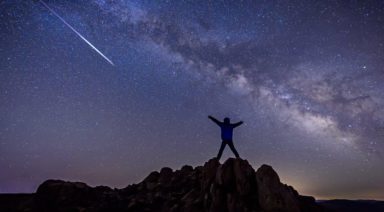Sacrifice as a Catalyst for Rebirth and Bliss in Joseph Campbell’s Hero’s Journey

Joseph Campbell is one of the most influential writers, philosophers, and professors in history. His work on mythology has taken native stories beyond their face value and deep into the human psyche, where they resonate with the core of who we are.
Campbell’s life’s work brought countless people across the world in touch with the collective unconscious that underlies our every thought and motivates us to seek happiness. His phrase “follow your bliss” is now a household prompt, thanks to a series of interviews with celebrated journalist Bill Moyers in the early ‘90s. Gaia members can now experience this timeless discussion, listening to episodes discussing “The Hero’s Adventure”, “Sacrifice and Bliss”, and more.
Campbell’s teachings applied the lessons of heroes and metaphors of mythology to our own lives. “A myth is not a lie,” he famously said, despite this commonly misused definition. Rather, a myth is a story meant to turn the mind inward to reflect upon itself and reveal the essential truths of reality and our relationship to the transcendent.
As Campbell explains in his series of interviews with Moyers, myth is often constructed as a hero’s journey — a pivotal course of events that slowly test the story’s protagonist and push them to the next step of unfoldment — toward transcendence. Each obstacle the hero experiences is a reflection of himself, as he is moved one step closer to sacrifice the egoic sense of self to the greater good, which is total consciousness.
When we study mythology, Campbell taught, we find the theme of sacrifice to be all-important. We must let go in order to receive what is already present. Campbell said, “A hero is someone who has given his or her life to something bigger than oneself.” The hero sacrifices his lower nature for his higher nature, and his safety for the one he rescues, or perhaps an object of desire for a noble cause.
Campbell taught that sacrifice is a theme that runs through all things natural — death (the sacrifice of a living being) gives way to new life in an ever-continuing cycle. But death is often metaphorical and may be the death of a habit, a pattern of thinking, or an attachment to something. Or, he said, “When you make the sacrifice in marriage, you’re sacrificing not to each other but to unity in a relationship.”
Perhaps the most poignant and revealing teaching that arises from the Campbell-Moyers interview on “Sacrifice and Bliss” is that once the hero has made “the ultimate sacrifice,” there is a realization that takes place. This is the stuff of enlightenment wherein the act of total surrender of the personal self gives way to the realization that there is no “other.”
This, said Campbell, is “the breakthrough of a metaphysical realization that you and the other are one” — and that the idea of separation (a separate “me” and “you”) is only due to being stuck in the temporal idea of time and space created by the egoic self. Finding this truth about Oneness, Campbell told Moyers, “is not a concept; this is a realization.”
The award-winning conversation between Moyers and Campbell is now a timeless classic. It is not only eye-opening for viewers who are new to the depth of thought behind mythology and metaphor, but also for those who have seen the interviews over and over again. Now streaming on Gaia, Campbell’s immortal words are readily available for everyone’s next step on their spiritual journey—their own personal hero’s journey toward transcendence.
Manifest Reality: 10 Powerful Steps to Manifesting the Life You Want

You have the power to manifest your reality and turn your dreams into tangible outcomes. Through visualization, affirmation, and positive thinking, you can align your actions with your goals and overcome limiting beliefs to create the life you want. Manifestation is more than wishful thinking; it’s about aligning your belief system, taking intentional action, and using manifestation techniques to achieve your desired outcomes.
Intention transforms. Whatever you place your attention on will expand and flourish in your life. To manifest your reality, align with clear goals, nurture uplifting energy, and trust the unfolding of the process. Let’s explore the steps and techniques to bring your dreams into being.
What Does It Mean to Manifest Reality?
Manifestation is the process of using your thoughts, emotions, and actions to turn your dreams into reality. It’s about aligning with the desired energy and working toward your goals while overcoming self-doubt and negative thoughts.
Key Elements of Manifestation:
- Visualization: See your desired outcome clearly in your mind.
- Belief System: Develop unwavering belief in your ability to succeed.
- Manifestation Practices: Use tools like vision boards, journaling, and affirmations.
- Positive Energy: Focus on cultivating positivity and letting go of negativity.
To manifest reality, you must align your actions and mindset with the specific goals you want to achieve in daily life.




































